新人教版八上《Unit 5 Can you come to my party》word教案
- 格式:doc
- 大小:82.50 KB
- 文档页数:8
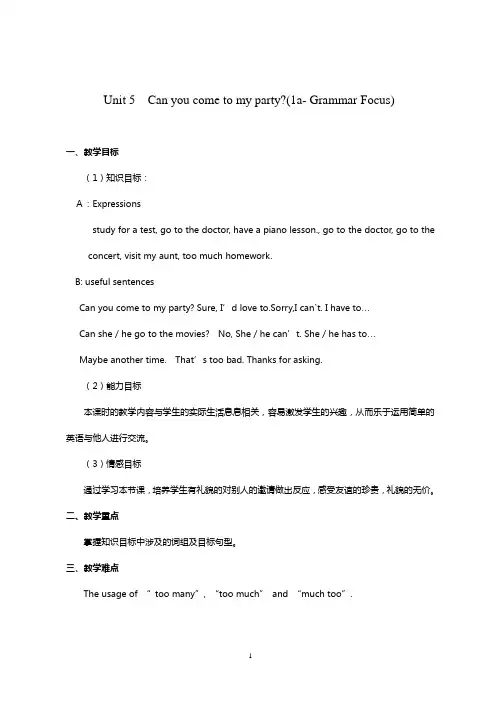
Unit 5 Can you come to my party?(1a- Grammar Focus)一、教学目标(1)知识目标:A:Expressionsstudy for a test, go to the doctor, have a piano lesson., go to the doctor, go to the concert, visit my aunt, too much homework.B: useful sentencesCan you come to my party? Sure, I’d love to.Sorry,I can’t. I have to…Can she / he go to the movies? No, She / he can’t. She / he has to…Maybe another time. That’s too bad. Thanks for asking.(2)能力目标本课时的教学内容与学生的实际生活息息相关,容易激发学生的兴趣,从而乐于运用简单的英语与他人进行交流。
(3)情感目标通过学习本节课,培养学生有礼貌的对别人的邀请做出反应,感受友谊的珍贵,礼貌的无价。
二、教学重点掌握知识目标中涉及的词组及目标句型。
三、教学难点The usage of “ too many”, “too much” and “much too”.四、教学方法任务型教学法、学案导学、小组合作五、教学过程StepⅠ Leading-in(1)Check what they did before class.Teach new words and phrases.(2)Do 1a.(3) A competition: what are they doing?[设计说明] 通过比赛,使学生争先恐后地参与到活动中来。
在玩游戏中巩固了所学知识. 图片包括1a中出现的5幅加上后面听力中出现的 play soccer, go to the movies, go to the concert.StepⅡ PresentationCan you come to my party? Sure, I’d love to.Sorry, I can’t, I have to…[设计说明] 本部分是句型认知部分,通过活动让学生掌握句型的使用,有助于学生正确模仿,直接理解所学英语,强化记忆。
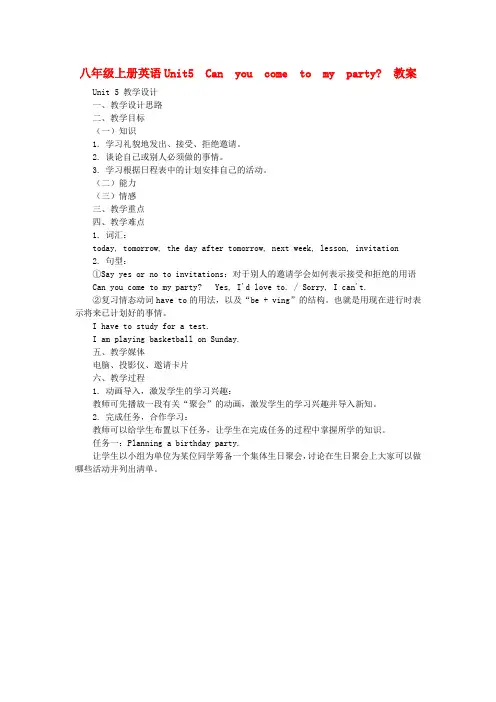
八年级上册英语Unit5 Can you come to my party? 教案Unit 5 教学设计一、教学设计思路二、教学目标(一)知识1. 学习礼貌地发出、接受、拒绝邀请。
2. 谈论自己或别人必须做的事情。
3. 学习根据日程表中的计划安排自己的活动。
(二)能力(三)情感三、教学重点四、教学难点1. 词汇:today, tomorrow, the day after tomorrow, next week, lesson, invitation2. 句型:①Say yes or no to invitations:对于别人的邀请学会如何表示接受和拒绝的用语Can you come to my party? Yes, I'd love to. / Sorry, I can't.②复习情态动词have to的用法,以及“be + ving”的结构。
也就是用现在进行时表示将来已计划好的事情。
I have to study for a test.I am playing basketball on Sunday.五、教学媒体电脑、投影仪、邀请卡片六、教学过程1. 动画导入,激发学生的学习兴趣:教师可先播放一段有关“聚会”的动画,激发学生的学习兴趣并导入新知。
2. 完成任务,合作学习:教师可以给学生布置以下任务,让学生在完成任务的过程中掌握所学的知识。
任务一:Planning a birthday party.让学生以小组为单位为某位同学筹备一个集体生日聚会,讨论在生日聚会上大家可以做哪些活动并列出清单。
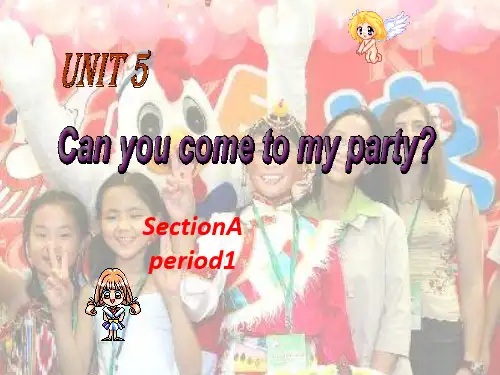
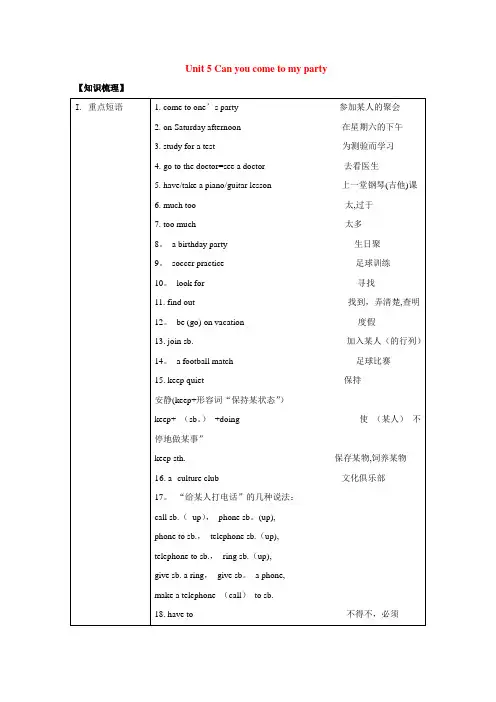
Unit 5 Can you come to my party【知识梳理】I. 重点短语 1. come to one’s party 参加某人的聚会2. on Saturday afternoon 在星期六的下午3. study for a test 为测验而学习4. go to the doctor=see a doctor 去看医生5. have/take a piano/guitar lesson 上一堂钢琴(吉他)课6. much too 太,过于7. too much 太多8。
a birthday party 生日聚9。
soccer practice 足球训练10。
look for 寻找11. find out 找到,弄清楚,查明12。
be (go) on vacation 度假13. join sb. 加入某人(的行列)14。
a football match 足球比赛15. keep quiet 保持安静(keep+形容词“保持某状态”)keep+ (sb。
)+doing 使(某人)不停地做某事”keep sth. 保存某物,饲养某物16. a culture club 文化俱乐部17。
“给某人打电话”的几种说法:call sb.(up),phone sb。
(up),phone to sb.,telephone sb.(up),telephone to sb.,ring sb.(up),give sb. a ring,give sb。
a phone,make a telephone (call)to sb.18. have to 不得不,必须19。
the day after tomorrow 后天20。
a science report 科学报告II. 重要句型邀请用语1. Can you come to my party?= Would you like to come to my party?肯定回答:Sure,I’d love to。
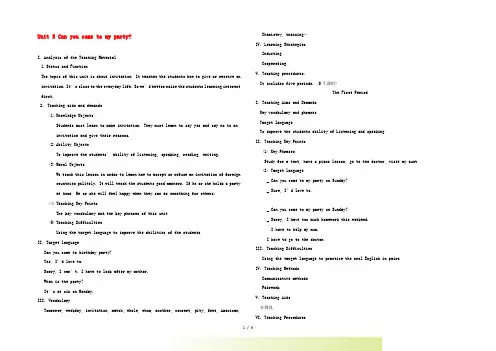
Unit 5 Can you come to my party?I. Analysis of the Teaching Material1.Status and FunctionThe topic of this unit is about invitation. It teaches the students how to give or receive an invitation. It’s close to the everyday life. So we’d better raise the students learning interest first.2.Teaching aids and demands(1)Knowledge ObjectsStudents must learn to make invitation. They must learn to say yes and say no to aninvitation and give their reasons.(2)Ability ObjectsTo improve the students’ ability of listening, speaking, reading, writing.(3)Moral ObjectsWe teach this lesson in order to learn how to accept or refuse an invitation of foreigncountries politely. It will teach the students good manners. If he or she holds a partyat home, He or she will feel happy when they can do something for others.(4)Teaching Key PointsThe key vocabulary and the key phrases of this unit(5)Teaching DifficultiesUsing the target language to improve the abilities of the studentsII. Target languageCan you come to birthday party?Yes, I’d love to.Sorry, I can’t. I have to look after my mother.When is the party?It’s at six on Monday.III. VocabularyTomorrow, weekday, invitation, match, whole, whom, another, concert, pity, free, American,Chemistry, training…IV. Learning StrategiesInductingCooperatingV. Teaching procedures.It includes five periods. (5个课时)The First PeriodI. Teaching Aims and DemandsKey vocabulary and phrasesTarget languageTo improve the students ability of Listening and speakingII. Teaching Key Points(1) Key PhrasesStudy for a test, have a piano lesson, go to the doctor, visit my aunt (2) Target language_ Can you come to my party on Sunday?_ Sure, I’d love to._ Can you come to my party on Sunday?_ Sorry, I have too much homework this weekend.I have to help my mum.I have to go to the doctor.III. Teaching DifficultiesUsing the target language to practice the oral English in pairsIV. Teaching MethodsCommunicative methodsPairworkV. Teaching Aids多媒体VI. Teaching ProceduresStep 1Before the class, let the students listen to the music, this can guide to the new lesson. Afterthis, ask thestudents to watch the movie, this can guide to the target language.Step 2 (1a)Learn the phrases and do the exercise in 1a.The answer is: b, d, a, c, eStep 3 (1b and 1c )First let the students read the dialogue in the picture. Then listen to it. (This activity provides guided oral practice using the target language). After the listening practice, ask the student to practice some invitations and refusals.Step 6 (Blackboard design)Unit 5How about…? politeWhat about…? impolite The second periodI Teaching aims and demands1. Knowledge ObjectsKey vocabularyTarget languageGrammar focus2. Ability Objects_ ListeningII. Teaching key points1. key vocabularyhey, baseball game, too much homework2. Target languageA: Hey, Dave! Can you come to the movies on Saturday? B: I’m sorry, I can’tI have too much homework.I have to help my mum.I have to go to my guitar lesson.I have to visit my aunt.III Teaching difficultiesGrammar focusIV Teaching methodsListening and speaking methods.Communicative approachPairwork.VI Teaching procedureStep IGreet the class and check the homeworkStep II (2a)First, make the preparation for listening. Read the sentences twice to the class. The first time you can read “can”, the second time you can read “can”. Then let the students listen .The answers for activity 2a are : 1. can’t , 2.can 3. can’t 4. can’t 5.canStep III (2b)Ask a student to read the sentences in the box.. Tell the students these are the reason why people can’t go to the party. Listen to the recording again and number the reasons 1~3 why they can’t go to the party .The answers are : a . 2 d . 3 e . 1Step IV (2c)This is an oral practice about the target the language . You can ask the student if they can give other reasons besides the ones in 2a . If they can, make a dialogue in pair . ( First , ask two who can do it well to make a model dialogue , then let them do it in pairs .Step V . ( Grammar focus)First , let the students read the sentences in the grammar box . Then write “ have to , has to ” on the blackboard , and tell them they are used to say no to an invitatio n . And then write “ be going to do something ” on the blackboard , tell the students we can say no to an invitation by talking about the future plan . After that , let them do exercises in order to master to the grammar .Step V. Blackboard designUnit 51. have to /has to + verbThey have to go to the acting lesson on Sunday.Lucy has to help her mom with the housework.Do they have to go to the acting lesson on Sunday.Yes, they do. / No, they don’t.Does Lucy have to help her mom with the housework?Yes, she does. / No, she doesn’t.2. Can you come to…? Sure, I’d love to. / Sorry, I can’t. I haveto…Can she come to…? No, she can’t. She has to…Step VI . HomeworkPlease write as many reasons as you can to refuse an invitationThe Third PeriodI Teaching aims and demands1. Vocabulary and phrases Oral practice2. Ability objectsReading, writing, communicative competenceII. Teaching key PointsReview vocabulary items and grammar focusIII. Teaching difficultyOral practice using the target languageI. Teaching methodsReading, writing methods and communicative approachV. Teaching proceduresA computerVI. Teaching proceduresStep IGreet the class and let a student to make a duty report. And then check the homeworkStep II (3a writing)Show the invitation in 3a to the students. Ask the students to fill in the blanks according to the information of the invitation.The answers are: can, party, when, on Friday, June 30 4:30Step III (oral practice)Practice the dialogue in 3a in pairs and then let some of the act the dialogue.Step IV (writing)Let the students fill in the card with details of an event. Then call your friends and invite them to the event.Step V Invite a friend (oral practice)Tell the students how to do the activity: Student A, you are Eliza. Look at page 82. Eliza , invite Lu Qing to go to the mall . Look at the calendar for this week and find a time when you can both go there.Use the dialogue in the box to start the activity , and then ask more questions to learn when both people aren’t busy . Help students to start the work, give them a hand if needed.The answers: Lu Qing and Eliza are both free on Wednesday afternoon , Friday afternoon , Saturday and SundayStep VI. SummaryToday we have learnt how to write an invitation and done a lot of practice.Step VII HomeworkGive your best friend an invitation to an event.The student who receives it must give a reply.Step III . Blackboard designUnit 51. Lu Qing and Eliza are both Free on :2. have fun /have a great timeWednesday afternoon 3. join/take part inFriday afternoon 4. have a piano lessonSaturday have a swimSunday have a lookThe Fourth Period I. Teaching aims and demands.Target languageOral practiceII. Ability objects.Listening skillSpeaking skillCommunicative competenceIII. Teaching key points1.Key vocabulary.Sunday, Monday, Tuesday, Wednesday, Thursday, Friday, Saturday Yesterday, today, tomorrow, the day after tomorrow2.Target language.What’s today?It’s Monday the 14th.Can you play tennis with me?When?Today.Sorry, I can’t.IV. Teaching difficulties.The target languageV. Teaching methods.Listening and speaking methods.VI. Teaching aids.A calendarA computerVII. Teaching procedure.Step 1Greet the class and check the homework.Step 2 (Section B 1a)Show the students a calendar, and ask a student to point out today’s date. Point to the number which shows the dates, and ask the students to copy them into the calendar in their book.Read the dates and let the students read after you.Step III (1b)1.Show the words on the screen:Yesterday, today, tomorrow, the day after tomorrow, weekday2.Let the students write the words below the correct days on the calendar in 1a.Step IV (1c)First ask two students to read the dialogue in the box. Then let them practice it in pairs by using the calendar in 1a.Step IX Blackboard designThe Fifth period I. Teaching aims and demands.1. Knowledge objectsE-mail messageWriting practiceReading practice2Ability objectsReading and writing skillCommunicative competenceII. Teaching key pointsReading passage主语+verb+-ing I have to…III. Teaching difficultiesReading and wring practice.IV. Teaching methodsReading and writing methods and communicative approach.V. Teaching aidsA calendarVI. Teaching proceduresStep 1Greet the class, do the duty report.Step 2 (3a )First, read the e-mail message to the students. Ask the students if they have any questions.If they do, answer them. Then let the students fill in the calendar on the book. After this, explain the key language points to them.Language points:1. Thank you for… (为……表示感谢)Thank you for helping me.Thank you for your invitation.2On ( 在某天,在某天的上午、下午或晚上)I’m going to the dentist on Sunday.Unit 5Sunday, Monday, Tuesday, Wednesday, Thursday, Friday, Saturday The____ the_____ the_____ the______ the_____ the____ the_____ Yesterday, today, tomorrow, the day after tomorrowOn Friday afternoon, I often play soccer.The answers to the calendar are:SundayMonday Cousin’s birthday partyTuesday Go to the dentistWednesdayThursday Tennis trainingFriday Study for the chemistry testSaturday Go to the moviesStep 3 (3b)First, tell the students when we talk about our future plans, we often use: I’m+verb+ing When we talk about what we must do, we use have to.Ask the students to fill in the blanks in 3b.The answers are: shopping, go to see, a test, I’m going, my family.Step 4 (3c)Let the students write an e-mail message to a friend. Say why you can’t visit next.Before the exercise, ask the students to give some possible answers and write them on the blackboard. So the students will feel easy to finish the writing exercise. After they finish it, Let them to correct it in groups first. Each group chooses theirs best one to read in front of the whole class.Step 5 ( planning a party )First read the conversation in the box together. Then ask the students to turn to page 88. Write down everything you have to do next week. Write in all the things you have to do .Ask the students to look at the list. Ask them “What day are you free?” This is when you can have your party.Step 6 (Self check 1 )Let the students to fill in the blanks with the words given. Change the forms of the words if possible. Then make their own sentences. The answers are: visit, playing, have to, study, comeStep 7 (Self check 2)Imagine you are Marie. Read the information and look at your schedule. Write replies to the invitation.VII. Summary and homeworkToday we have learnt how to write a e-mail to a friend. You can write another one to your frien after class.Step 8 Blackboard designUnit 51. Thanks for…2. on Sunday at 4:00Thanks for helping me. I’m going to the dentist on Sunday.Thanks for your invitation. I often get up at 4:00.。
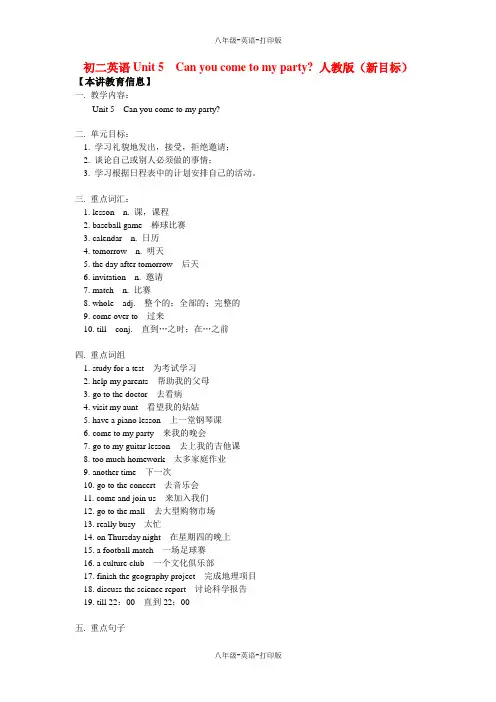
初二英语Unit 5 Can you come to my party? 人教版(新目标)【本讲教育信息】一. 教学内容:Unit 5 Can you come to my party?二. 单元目标:1. 学习礼貌地发出,接受,拒绝邀请;2. 谈论自己或别人必须做的事情;3. 学习根据日程表中的计划安排自己的活动。
三. 重点词汇:1. lesson n. 课,课程2. baseball game 棒球比赛3. calendar n. 日历4. tomorrow n. 明天5. the day after tomorrow 后天6. invitation n. 邀请7. match n. 比赛8. whole adj. 整个的;全部的;完整的9. come over to 过来10. till conj. 直到…之时;在…之前四. 重点词组1. study for a test 为考试学习2. help my parents 帮助我的父母3. go to the doctor 去看病4. visit my aunt 看望我的姑姑5. have a piano lesson 上一堂钢琴课6. come to my party 来我的晚会7. go to my guitar lesson 去上我的吉他课8. too much homework 太多家庭作业9. another time 下一次10. go to the concert 去音乐会11. come and join us 来加入我们12. go to the mall 去大型购物市场13. really busy 太忙14. on Thursday night 在星期四的晚上15. a football match 一场足球赛16. a culture club 一个文化俱乐部17. finish the geography project 完成地理项目18. discuss the science report 讨论科学报告19. till 22:00 直到22:00五. 重点句子1. Can you come to my party?I'm sorry. I can't. I have to help my mom. /Sure, I'd love to.2. Can she go to the movies? No, she can't.She's playing soccer.3. Can he go to the baseball game?No, he can't. He has to study.4. Can they go to the concert? No, they can't.They're going to a party.5. What are you doing on Tuesday evening?I'm baby sitting my younger sister.六. 重,难点解析1. 情态动词can的用法(1)表示能力,意思是“能”eg Can you sing?你会唱歌吗?Yes, I can.是的,我会。
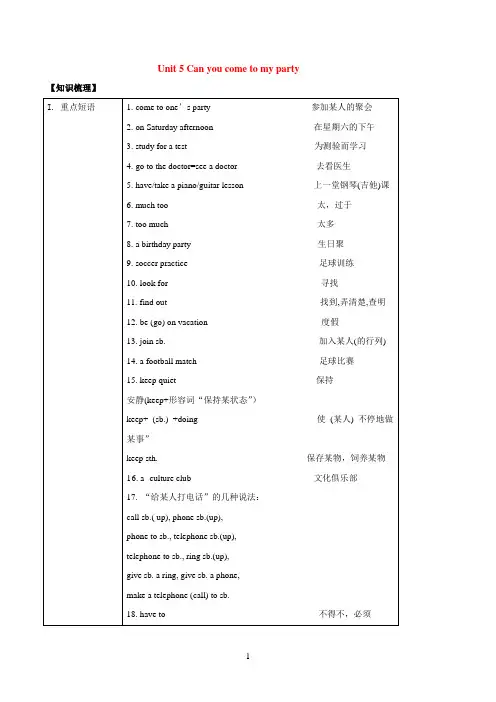
Unit 5 Can you come to my party【知识梳理】I. 重点短语 1. come to one’s party 参加某人的聚会2. on Saturday afternoon 在星期六的下午3. study for a test 为测验而学习4. go to the doctor=see a doctor 去看医生5. have/take a piano/guitar lesson 上一堂钢琴(吉他)课6. much too 太,过于7. too much 太多8. a birthday party 生日聚9. soccer practice 足球训练10. look for 寻找11. find out 找到,弄清楚,查明12. be (go) on vacation 度假13. join sb. 加入某人(的行列)14. a football match 足球比赛15. keep quiet 保持安静(keep+形容词“保持某状态”)keep+ (sb.) +doing 使(某人) 不停地做某事”keep sth. 保存某物,饲养某物16. a culture club 文化俱乐部17. “给某人打电话”的几种说法:call sb.( up), phone sb.(up),phone to sb., telephone sb.(up),telephone to sb., ring sb.(up),give sb. a ring, give sb. a phone,make a telephone (call) to sb.18. have to 不得不,必须19. the day after tomorrow 后天20. a science report 科学报告II. 重要句型邀请用语1. Can you come to my party?= Would you like to come to my party?肯定回答:Sure, I'd love to.否定回答:I'm sorry. I can't. I have to do my homework.2. Maybe another time.3. Thanks for asking (inviting). 谢谢邀请。
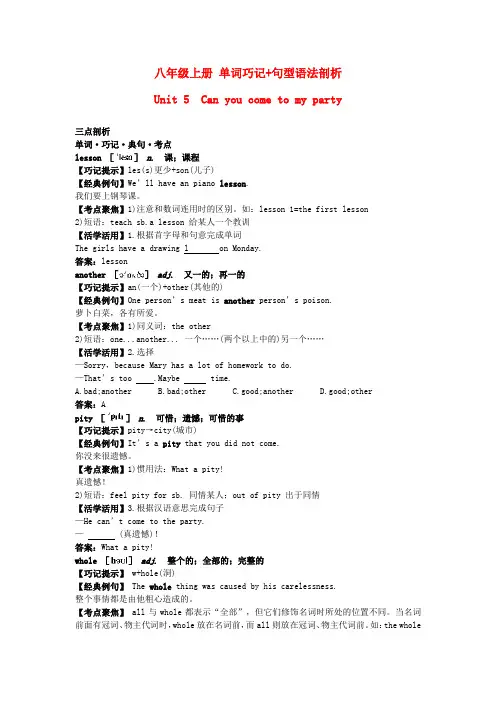
八年级上册单词巧记+句型语法剖析Unit 5 Can you come to my party三点剖析单词·巧记·典句·考点lesson []n课;课程【巧记提示】les(s)更少+son(儿子【经典例句】We’ll have an piano lesson我们要上钢琴课。
【考点聚焦】1)注意和数词连用时的区别。
如:2)短语:teach sb.a lesson 给某人一个教训【活学活用】1.根据首字母和句意完成单词The girls have a drawing l on Monday.答案:lessonanother []adj又一的;再一的【巧记提示】an(一个)+other(其他的【经典例句】One person’s meat is another person’萝卜白菜,各有所爱。
【考点聚焦】1)同义词:2)短语:one...another... 一个……(两个以上中的)另一个【活学活用】2.选择—Sorry,b—That’s too .MaybeA.bad;anotherB.bad;otherC.good;anotherD.good;other答案:Apity [] n可惜;遗憾;可惜的事【巧记提示】pity→city(城市【经典例句】It’s a pity你没来很遗憾。
【考点聚焦】1)惯用法:What a真遗憾!2)短语:feel pity for sb. 同情某人;out of pity 出于同情【活学活用】3.根据汉语意思完成句子—He can’— (真遗憾)!答案:What a pity!whole []adj整个的;全部的;完整的【巧记提示】 w+hole(洞【经典例句】 The whole整个事情都是由他粗心造成的。
【考点聚焦】 all与whole都表示“全部”,但它们修饰名词时所处的位置不同。
当名词前面有冠词、物主代词时,whole放在名词前,而all则放在冠词、物主代词前。
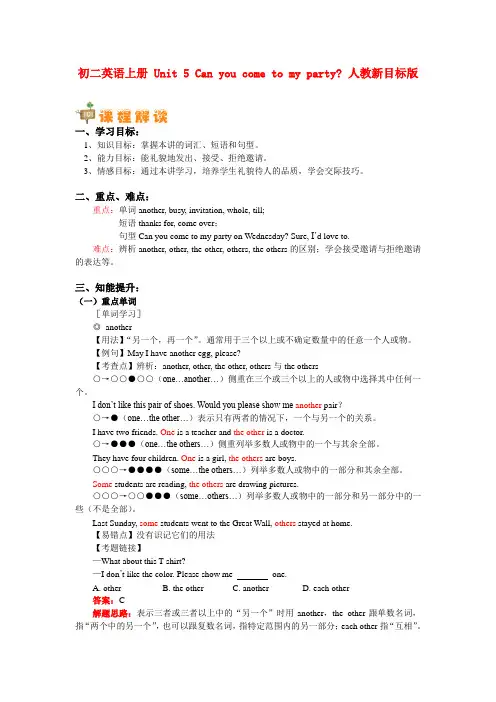
初二英语上册 Unit 5 Can you come to my party? 人教新目标版一、学习目标:1、知识目标:掌握本讲的词汇、短语和句型。
2、能力目标:能礼貌地发出、接受、拒绝邀请。
3、情感目标:通过本讲学习,培养学生礼貌待人的品质,学会交际技巧。
二、重点、难点:重点:单词another, busy, invitation, whole, till;短语thanks for, come over;句型Can you come to my party on Wednesday? Sure, I’d love to.难点:辨析another, other, the other, others, the others的区别;学会接受邀请与拒绝邀请的表达等。
三、知能提升:(一)重点单词[单词学习]◎another【用法】“另一个,再一个”。
通常用于三个以上或不确定数量中的任意一个人或物。
【例句】May I have another egg, please?【考查点】辨析:another, other, the other, others与the others○→○○●○○(one…another…)侧重在三个或三个以上的人或物中选择其中任何一个。
I don’t like this pair of shoes. Would you please show me another pair?○→●(one…the other…)表示只有两者的情况下,一个与另一个的关系。
I have two friends. One is a teacher and the other is a doctor.○→●●●(one…the others…)侧重列举多数人或物中的一个与其余全部。
They have four children. One is a girl, the others are boys.○○○→●●●●(some…the others…)列举多数人或物中的一部分和其余全部。
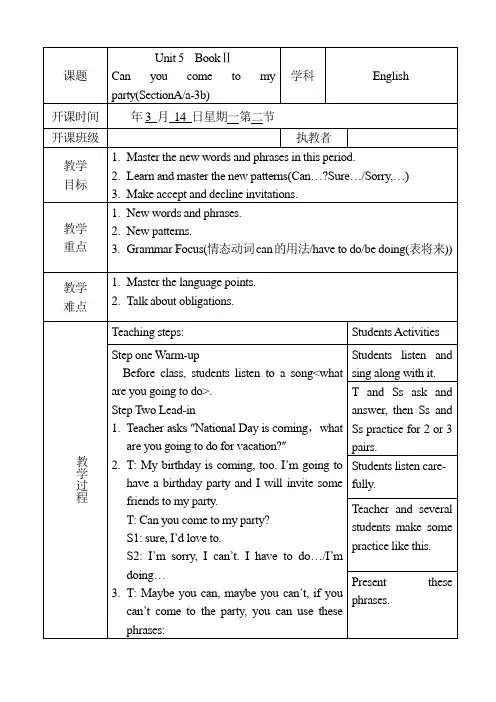
课题Unit 5 BookⅡCan you come to myparty(SectionA/a-3b)学科English开课时间年3 月14 日星期一第二节开课班级执教者教学目标1.Master the new words and phrases in this period.2.Learn and master the new patterns(Can…?Sure…/Sorry,…)3.Make accept and decline invitations.教学重点1.New words and phrases.2.New patterns.3.Grammar Focus(情态动词can的用法/have to do/be doing(表将来))教学难点1.Master the language points.2.Talk about obligations.教学过程Teaching steps: Students Activities Step one Warm-upBefore class, students listen to a song<whatare you going to do>.Step Two Lead-in1.Teacher asks ″National Day is coming,whatare you going to do for vacation?″2.T: My birthday is coming, too. I’m going tohave a birthday party and I will invite somefriends to my party.T: Can you come to my party?S1: sure, I’d love to.S2: I’m sorry, I can’t. I have to do…/I’mdoing…3.T: Maybe you can, maybe you can’t, if youcan’t come to the party, you can use thesephrases:Students listen andsing along with it.T and Ss ask andanswer, then Ss andSs practice for 2 or 3pairs.Students listen care-fully.Teacher and severalstudents make somepractice like this.Present thesephrases.1>have a piano lesson2>study for a test2>help my parents 4>go to the doctor.5>visit my aunt 6>go to a concert.Step Three Practice1.T: Suppose you are going to have a birthdayparty and want to invite some good friends.Practice in pairs and you can use the six phrases.2.Students practice in pairs to practice thenew patterns. Then check some pairs. Step Four Listening and Practice1.Anna’s birthday is coming too, she’s goingto have a birthday party and invite some of her good friends to her party.1>Can they come to the party?Listen and fill in the chart by themselves. Students read them after the teacher and pay attention to the new words. Students work in pairs to practice. Then check some pairs.Students listen to the tape and fill in the blanks with “can’t/can”Name Can’t/can Reasons(原因)JeffMaryMayClaudiaPaul2.Check the answers on by one.3.Listen again and answer: Why can’t theycome to the party?4.Then check the answers carefully one byone.5.(S)Let’s make a report according to thechart.The beginning likes this: After listening, then check the answers one by one.Students listen again and fill in the blanks with the reasons.Students say out the reasons教学过程Sample: A ReportAnna’s birthday is coming, she is going tohave a party and she’ll invite some of her friendsto come to her party. But Jeff can’t come to heparty, because…6. Then check some students’ reports.Step Five Read and LearnSB Page 27. 3a and 3b.Birthday InvitationIt’s a Birthday Party!For whom: LisaTime: Friday, June 30, at four thirty.Place: Lisa’s house, 15th Street.Come and have fun!Lisa: Hi, Simon,you come to my?Simon: is it?Lisa: It’sat.Simon: Great! I’d love to.Students make areport according tothe chart.Check somestudentsAsk students to readthis invitation care-Fully and completethe conversation.Then check theanswers to them oneby one.6.Read and complete the conversationcarefully.7.Check the answers one by one and practicein pairs.Practice it in pairs.Students design theirown cards bythemselves.Students practice thebirthday cards withthe partner.8.Design your own Birthday Invitationaccording to 3a.Birthday InvitationIt’s a !For whom: .Time: .Place: .Come and have fun! Students do some consolidation exercises to consolidate some language points in this period.教学反思9.Then practice in pairs with your partner totalk about your birthday card.Step Six ConsolidationSome consolidation exercises:3.I can’t go to movies. I have to my piano l.4.Sorry, I can’t go to your party, maybe atime.3. They are having a cnext week.4.-Can you (come) to my party, please?-Sorry, I have to(study) for a test.5. Thanks for(ask) us!Two students writethe answers on theBb, the others writeon their exercisebooks.Check the answerscarefully one byone.First ask students tosum up bythemselves, then theteacher adds some.教学过程6.I’m(go) to the movies this Sunday.7. I’d love(come) over to your house to see your parents.8. Whatyou(do) this Sunday? Are you free?9. Lucy can’t(swim). She is too young.10.-Oh, it’s time to have the English party.-(come) and have fun.Step Seven Sum upThis class we have learn:1>word: e.g. concert, lesson, another, whom,2>Some Phrases: have a piano lesson…..3>new patterns:-can you….? (发出邀请)-Sure, I’d love to. (接受邀请)I have to do…-Sorry, I can’t. ﹛I’ m doing…(拒绝邀请)4.Grammars:1) have to do2) be doing sth. (现在进行时表示将来)* “Families and fiends are the biggest happiness for every one!”*教学反思本节课主要以过生日举行生日聚会为主题展开听、说、读等各项活动,一开始由国庆节快到了,引出你将要做什么这一话题,后到我的生日快到了,我将要举办一个生日聚会--邀请朋友到聚会上来--Anna的生日聚会(进行听、说练习)--读Lisa的生日邀请函并做对话--设制自己的生日邀请函并和搭档做练习对话--做相应的巩固练习题--总结本节课的学习内--情感升华--家人和朋友对每个人来说是最大的幸福和快乐!。
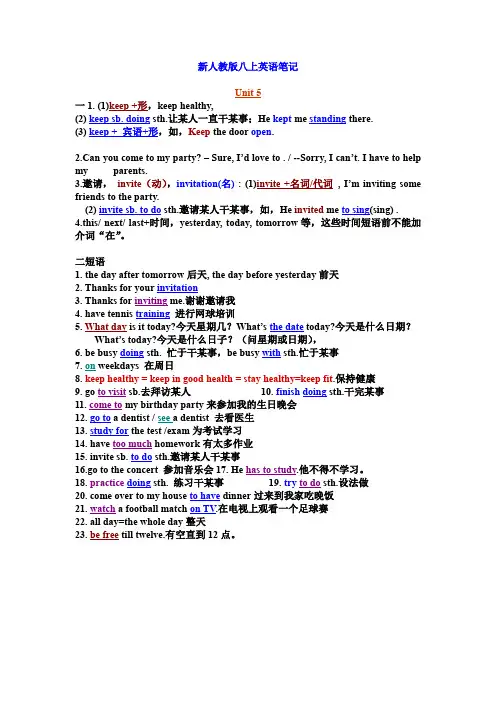
新人教版八上英语笔记Unit 5一1.(1)keep +形,keep healthy,(2) keep sb. doing sth.让某人一直干某事;He kept me standing there.(3) keep + 宾语+形,如,Keep the door open.2.Can you come to my party? – Sure, I’d love to . / --Sorry, I can’t. I have to help my parents.3.邀请,invite(动),invitation(名): (1)invite +名词/代词, I’m inviting some friends to the party.(2) invite sb. to do sth.邀请某人干某事,如,He invited me to sing(sing) .4.this/ next/ last+时间,yesterday, today, tomorrow等,这些时间短语前不能加介词“在”。
二短语1. the day after tomorrow后天, the day before yesterday前天2. Thanks for your invitation3. Thanks for inviting me.谢谢邀请我4. have tennis training进行网球培训5. What day is it today?今天星期几?What’s the date today?今天是什么日期?What’s today?今天是什么日子?(问星期或日期),6. be busy doing sth. 忙于干某事,be busy with sth.忙于某事7. on weekdays 在周日8. keep healthy = keep in good health = stay healthy=keep fit.保持健康9. go to visit sb.去拜访某人10. finish doing sth.干完某事11. come to my birthday party来参加我的生日晚会12. go to a dentist / see a dentist 去看医生13. study for the test /exam为考试学习14. have too much homework有太多作业15. invite sb. to do sth.邀请某人干某事16.go to the concert 参加音乐会17. He has to study.他不得不学习。
八年级英语Unit 5 Can you come to my party?一.教学内容:Unit 5 Can you come to my party?二.教学目标通过本课的学习,我们应该能做下面的事:1. 学会礼貌地发出、接受、拒绝邀请。
2. 谈论自己或别人必须做的事情。
3. 学习根据日程表中的计划安排自己的活动。
4. 学习can及其它情态动词的用法。
三.教学重难点1. Make、accept and decline invitations发生、接受和拒绝邀请2. Talk about obligations 谈论义务四.教学过程1,greeting2, lead in3, grammer fouces★词汇用法:1. lesson n. 功课、课程We had a history lesson at school this morning. 我们今天早上在学校上了一堂历史课。
an English lesson=a lesson in English 英语课give lessons in drawing 上绘画课lesson与class的区别lesson课程(更强调上课的内容);class班级(更强调上课的环境)We have four lessons in the morning and two in the afternoon. 我们上午有4节课,下午有2节。
She was in a class of thirty students. 她在一个有30个学生的班里。
2. invitation n. 邀请I have received an invitation to their party. 我收到了他们宴会的请贴。
make invitations 发出邀请accept invitations 接受邀请decline invitations 拒绝邀请invite v. 邀请Thank you for inviting me. 谢谢你的邀请。
Unit5 Can you come to my birthday party ?主备人:李丽Section A.一、学习目标:Knowledge aims: 1) words and phrases : lesson, another, concert, whom, weekday, study for a test, have a(n)……lesson, have to, another time, go to the doctor.2) Important sentences: —Can you come to my birthday party?—Sure, I’d love to./ I’m sorry, I have to……二、教学重难点:1)熟练掌握情态动词Can 的用法2)准确表达邀请别人,接受和拒绝别人的邀请。
三、学习过程:(一)预习导学A.课程____2.又一个_____3.音乐会______4.为考试而学习______5.去看病_____6.上钢琴课______7.帮助我的父母_______8.拜访我的姑姑_______9.another time________10 谢谢你的邀请_________12go to the guitar lessons ______13.太多作业__________14.go to the concert__________15. 棒球比赛_______B.用所给单词的适当形式填空。
1.Thanks for_______(ask).2. I’m sorry. I have to ______(go) to my piano lesson.3. —Can she _____(go) to the movies? —No. s he can’t .She ______(play) soccer.4. I’d love _____(come) to your birthday party tomorrow.5. —Can they go to the concert? —No, they _____. They ______(go) to the party.(二)自主学习。
◎ another【用法】“另一个,再一个”。
通常用于三个以上或不确定数量中的任意一个人或物。
【例句】May I have another egg, please?【考查点】辨析:another, other, the other, others与the others○→○○●○○(one…another…)侧重在____个或____个以上的人或物中选择其中任何一个。
I don’t like this pair of shoes. Would you please show me another pair?○→●(one…the other…)表示只有___者的情况下,一个与另一个的关系。
I have two friends. One is a teacher and the other is a doctor.○→●●●(one…the others…)侧重列举多数人或物中的一个与其余全部。
They have four children. One is a girl, ______________(其余全是男孩)○○○→●●●●(some…the others…)列举多数人或物中的一部分和其余全部。
Some students are reading, the others are drawing pictures.○○○→○○●●●(some…others…)列举多数人或物中的一部分和另一部分中的一些(不是全部)。
Last Sunday, some students went to the Great Wall, others stayed at home.【考题链接】—What about this T-shirt?—I don’t like the color. Please show me one.A. otherB. the otherC. anotherD. each other◎ busy【用法】busy作形容词,意为“______”,反义词_______。
【例句】I’m very busy so I have no time to see you.【考查点】be busy with sth. 与be busy doing sth.他忙着做作业He __________his homework.忙于做……____________They are busy going shop ping for Tom’s birthday.【考题链接】The new term is coming. The students are busy the classrooms.A. cleanB. cleansC. to cleanD. cleaning◎ whole【用法】作形容词,表示________________,一般放在冠词、物主代词或指示代词之后。
如:the whole city, my whole life等。
【例句】The whole class is quiet and no one speaks.【考查点】辨析:all与wholeall 修饰名词时,常用于冠词、物主代词或指示代词之前。
如:all the world, all my life,所有的老师___________我所有的烦恼__________ 另外,whole 一般不修饰不可数名词或物质名词,而all 则可以。
如:all the water而不说the whole water【考题链接】All the family were at home when he called yesterday. (同义句转换)were at home when he called yesterday.◎ invitation【用法】“邀请,邀请书”,名词。
动词形式为____________。
【例句】1. There is a letter of invitation for you.2. She invited me to go shopping with her.【考查点】邀请某人做某事____________.【考题链接】Thank you very much for your . (invite)◎ till【用法】表示“直到……之时;在……之前”,相当于until。
作介词时,后面接名词;作连词时,常用来引导一个时间状语从句。
当用于肯定句时,主句动词常为延续性动词,表示这个动作一直延续到till/until所表示的时间为止。
【例句】1. They worked till/until six o’clock.2. Mary will wait for you till/until you come.【考查点】短语not… until/till 的用法not…until/till… 意为“直到……才……”,表示until/till 所表示的时间一到,主句谓语动词所表示的动作才发生。
He didn’t go to bed until/til l his mother came back.[即学即练]1. —Do you want cake?—Yes, I usually eat a lot when I’m hungry.A. otherB. the otherC. anotherD. others2. Though it is very long, I can tell story.A. the allB. the wholeC. all ofD. whole the3. They are busy their homework.A. to doB. doC. doingD. does4. Thank you for inviting me.(同义句转换)Thank you for .5. Please invite some of your friends with you.A. play soccerB. to play the soccerC. playing soccerD. to play soccer6. Since I had a lot of homework to do, I didn’t go to bed 12 last night.A. untilB. whenC. while7.I didn’t know he came back I met him in the street.A. sinceB. whenC. untilD. after(三)合作探究1.Practice the conversation like 2c.2.Finish 3a first and then make a birthday card like 3a.(四)拓展创新Look at your birthday card , practice the conversation like the following:A: Hey, Simon , can you come to the partyB: When is it?A: It’s Friday, June 30, at four thirty.B: Great! I’d love to.(五)梳理归纳What have you learned in this class? Please write them down:_________________________________________________________________________(六)达标检测一、单项选择。
1. —Happy birthday! —____________.A. ThanksB. The same to youC. I do tooD. Not at all2. You can’t find him. He usually _____ at 4:00.A. have an English lessonB. is having an English lessonC. will go to the guitar lessonD. goes to the guitar lesson3. —What are you going to do this weekend? —I’d like _____my parents.A.to visit B.visit C.visiting D. visit4. —She has a headache.She can’t attend the meeting. —______.A.It doesn’t matter B.It sounds wonderful C.I’m sorry to hear that D. really5. —I’m sorry,I can’t go to the movies with you.—Oh,that’s too bad.Maybe _____ time.A.the other B.other C.another D. others6.—Can you go to the science museum with me tomorrow?—_______,but I have to study for my chemistry test.A.I'd love to B.Never mind C.It’s nothing D. Yes, please7. He ______ stay at home, because his mother was ill.A. has toB. have toC. hadD. had to二、词汇A.根据首字母提示填空。